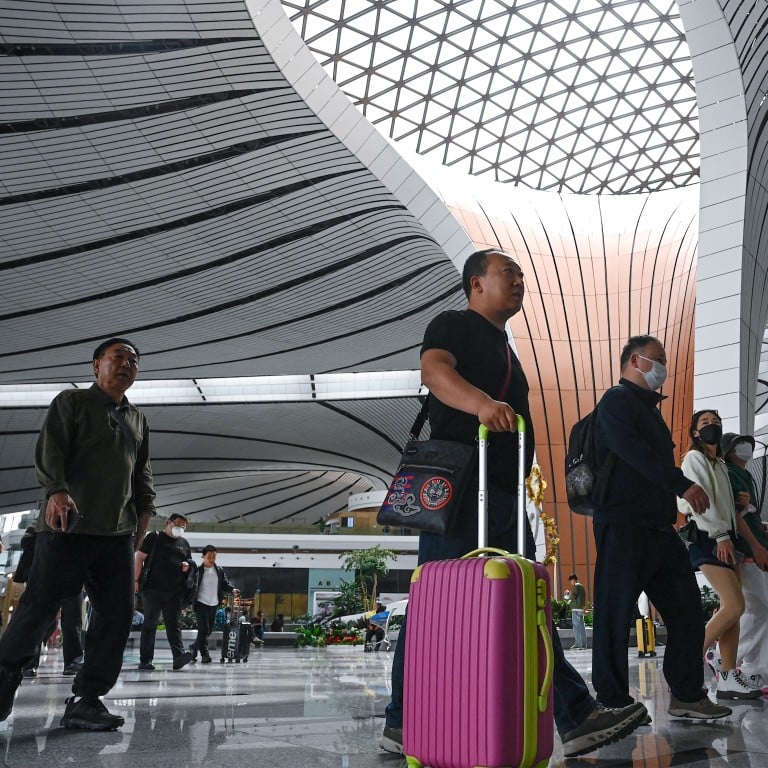
China relaxes visa rules further to boost tourism, business travel as economy falters
- New policies released by National Immigration Administration on Thursday include rules for entry visas, transit and extensions of stay
- Latest step is part of wider efforts by China to boost post-pandemic recovery in the world’s No 2 economy
The package was released by National Immigration Administration (NIA) on Thursday. It comes five months after Beijing relaxed a wide range of controls relating to the “free movement” of people, vehicles and data, in an effort to boost consumption and tourism amid an increasingly challenging geopolitical environment.
The new rules, which take effect immediately, will ease eligibility requirements for entry visas, waive border inspections for transit at certain airports, and streamline application procedures for entry visas, extensions of stay and multiple-entry permits.
“[The measures aim] to adapt to the current trend of efficient and speedy exchanges in international economic and trade activities,” NIA deputy commissioner Liu Haitao said.
In August, Beijing introduced on-arrival visas for business travellers. On Thursday, this was extended to foreign nationals needing to visit China urgently for family or other personal matters, though they still need to show supporting documents such as invitation letters.
This came after leaders at an annual economic work conference said addressing travel chokepoints for business, study and tourism was a priority for 2024.
China lifted three years of strict border controls related to its “zero-Covid” anti-pandemic policy early last year, but the expected economic or inbound tourism revival has yet to take off even as geopolitical and trade tensions with the West continue to rise.
“[The new measures] basically cover the vast majority of foreign nationals with urgent needs to come to China,” Mao Xu, head of the NIA’s Department of Foreigners Management, said on Thursday.
Liu also said the latest measures were a response to complaints from expatriates about lingering visa and entry difficulties despite the lifting of Covid curbs.
Chinese travel firms prepare for return of foreign tourists as outlook improves
Foreign nationals transiting through nine airports across eight Chinese cities, with a layover of 24 hours or less, will now no longer need to clear border control. However, they will still have to apply for a temporary entry permit if they wish to leave the restricted area of the airports, which are in Beijing, Shanghai, Hangzhou, Xiamen, Guangzhou, Shenzhen and Chengdu.
Also, foreigners on short-term visits for non-diplomatic and unofficial purposes can apply for visa extension, replacement and reissuance at the nearest immigration office, rather than only those near their registered address, if they have “justifiable and reasonable reasons” to remain in China.
Foreign visitors with “justifiable and reasonable reasons” to do so can also apply for an upgrade to a multiple-entry visa, with supporting documents like an invitation letter.
Hard copies of accommodation records and business licences will no longer be required for visa applications if the materials are available online, the NIA said. Expats may also use a declaration rather than a certificate of kinship when applying for short-term visas for family members overseas.
China to launch revamped ‘smart’ green card, easing online orders for foreigners
The new rules come amid concerns from observers that the slow return of overseas tourists would make China less attractive to overseas investors, deepen misunderstandings between societies and worsen geopolitical risks.
In measures taken over November and December, China has cut visa fees by 25 per cent until the end of this year, and expanded its 72- and 144-hour visa-free transit policy to cover citizens of 54 countries.
As of last month, visitors from France, Germany, Italy, the Netherlands, Spain and Malaysia no longer need a visa for stays of up to 15 days. This measure will stay in place until November 30.
China has since welcomed 147,000 inbound visa-free travellers from the six countries.
Border control authorities last year processed 210 million entries, including returning Chinese nationals, latest NIA data showed. But the figure was 37 per cent lower than that in 2019.
The agency did not elaborate on nationality breakdowns, but data for the January-September period showed international travellers accounted for less than 9 per cent of total border crossings.

